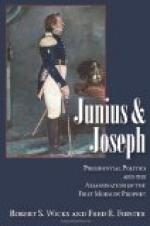Susannah was soothed. She knew that the truth was being spoken to her, and her heart leaped forth to do reverence, not only to it, but to the man who could find it in the midst of such insults. Ephraim was good. If he could only know how good Angel was, he would not have asked her to return. All thought of deserting the new cause now was gone; the blood that had trickled from Smith’s bruised head, the danger that menaced Halsey, sustained her. She wrote to Ephraim to that effect.
Some days after, when driving past Biery’s hotel from a meeting he had been holding in the town of Geneva, Joseph Smith entered and laid before Susannah books for the cultivation of her mind—a Latin grammar and exercise book like his own, a Universal History, and a primer of Natural Philosophy. He told her that in two weeks, when she had mastered their contents, he would bring her others. He left hastily, the business of the Church pressing.
In his idea it seemed that the rudiments of a language would take no longer to acquire than the contents of an English book written in a popular style. The man was very ignorant of the things that most men know, but possibly no other man in the world would have known that writing Latin exercises would bring contentment to Susannah’s heart. There was nothing in such a request to awake suspicion and antagonism, and there was much in the regular mental exercise to keep her mind from brooding on its scepticism or upon Ephraim’s kindness. As a child sits down to an intricate game, she sat down, day after day, to her lesson. Soon the stimulus of knowing that the prophet had actually mastered his grammar in two weeks wrought the determination not to lag very far behind. Her husband, who had had fair schooling, helped her.
There began to be a strange race between the prophet and Susannah for the acquisition of knowledge. They learned out of all sorts of lesson-books, not on any sound principle of work, but with avidity.
Susannah was the only woman in the new sect to whom Joseph Smith gave the commandment to become learned. She was not impervious to this subtle flattery. Rude and poor as he was, Smith was now spiritual dictator to a large number of souls, and she saw that from herself he sometimes asked counsel. Parted from Ephraim, having grown accustomed to a husband with whom self-repression was one of life’s first laws, it was not surprising that under Smith’s suggestion a new phase of life began in which her understanding, not her heart, developed. “Why believe in Moses and the prophets if not in Smith—in the miracles of yesterday if not in those of to-day?” was the question with which Halsey prefaced the sermons he began to preach. The answer that his logic deduced carried conviction to many of his hearers, but in Susannah’s mind the question alone made way.




